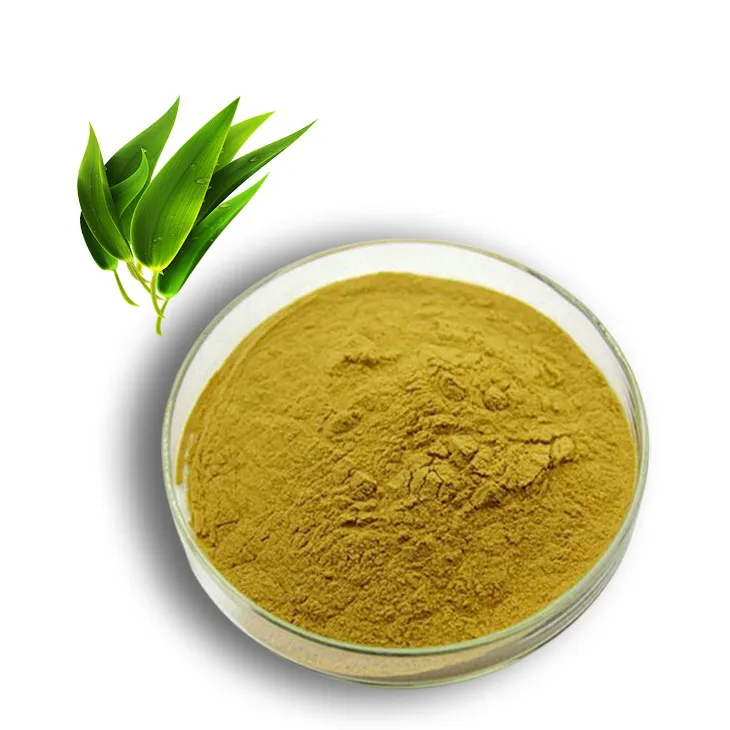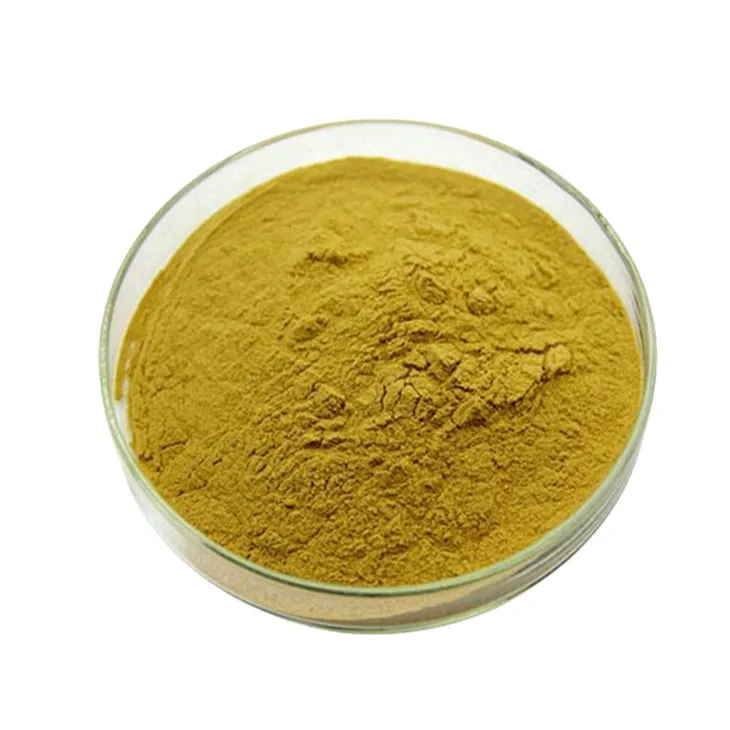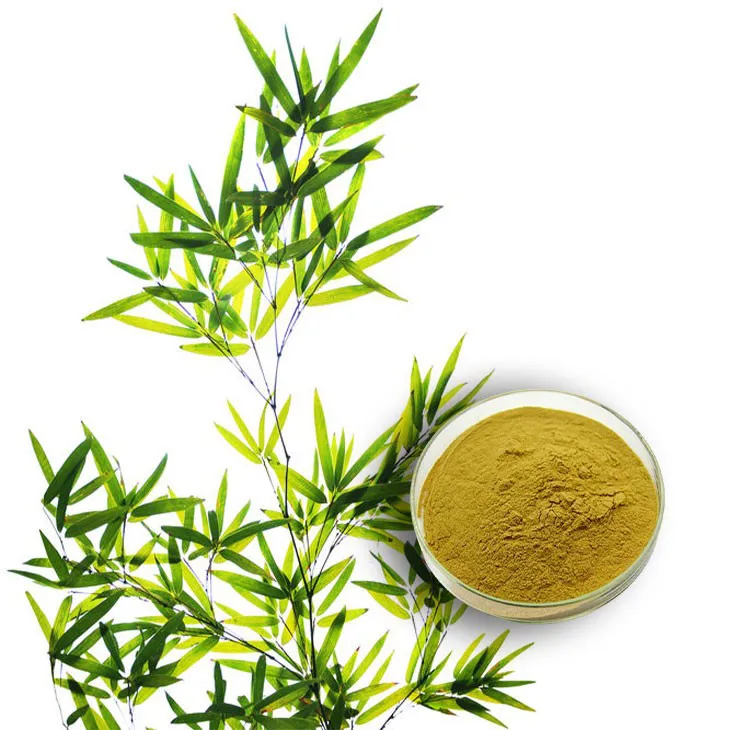- 0086-571-85302990
- sales@greenskybio.com
Bamboo leaf extract can reduce hypertension.
2024-11-13

1. Introduction to Hypertension
Hypertension, also known as high blood pressure, is a common chronic disease that affects a large proportion of the global population. It is defined as a sustained elevation of blood pressure above normal levels. Blood pressure is measured in terms of systolic pressure (the pressure when the heart contracts) and diastolic pressure (the pressure when the heart relaxes). High blood pressure can lead to various serious health complications, including heart disease, stroke, kidney failure, and retinopathy.

2. Bamboo Leaf extract: Composition and Properties
Bamboo Leaf extract has emerged as a potential agent in the management of hypertension. It contains several bioactive components, among which flavonoids and polysaccharides are of particular importance.
2.1 Flavonoids
Flavonoids are a class of polyphenolic compounds. In Bamboo Leaf extract, flavonoids play a crucial role in blood pressure regulation. They have the ability to protect vascular endothelial cells. The endothelial cells line the inner surface of blood vessels and are involved in maintaining vascular homeostasis. Flavonoids can prevent damage to these cells caused by factors such as oxidative stress. Moreover, flavonoids can also relax smooth muscle cells in the blood vessel walls. When smooth muscle cells relax, the diameter of the blood vessels increases, which in turn reduces resistance to blood flow and helps in lowering blood pressure.
2.2 Polysaccharides
Polysaccharides in bamboo leaf extract are another group of important components. They can regulate the immune function. A well - regulated immune system is important for overall health and may also play a role in blood pressure regulation. In addition, polysaccharides may have an impact on the renin - angiotensin - aldosterone system (RAAS). The RAAS is a complex hormonal system that plays a key role in blood pressure regulation. By affecting the RAAS, polysaccharides in bamboo leaf extract may contribute to the reduction of blood pressure.

3. Evidence of Antihypertensive Effects
There is growing evidence from both animal experiments and clinical trials to support the antihypertensive effects of bamboo leaf extract.
3.1 Animal Experiments
In animal models of hypertension, such as spontaneously hypertensive rats (SHRs), treatment with bamboo leaf extract has shown promising results. For example, in one study, SHRs were given bamboo leaf extract at different doses for a certain period. The results showed that the systolic and diastolic blood pressures of the rats in the treatment groups were significantly lower compared to the control group. Microscopic examination of the blood vessels of the treated rats also revealed improved endothelial cell function and reduced smooth muscle cell constriction. These findings suggest that bamboo leaf extract can effectively reduce blood pressure in hypertensive animals through its effects on vascular cells.
3.2 Clinical Trials
Some clinical trials have also been conducted to evaluate the antihypertensive effects of bamboo leaf extract in humans. In a small - scale clinical trial, hypertensive patients were randomly divided into two groups: one group received bamboo leaf extract supplementation, and the other group received a placebo. After a few weeks of treatment, the blood pressure of the patients in the bamboo leaf extract group showed a downward trend compared to the placebo group. Although the sample size of this trial was relatively small, it provided initial evidence for the potential antihypertensive effect of bamboo leaf extract in humans. Larger - scale and more comprehensive clinical trials are still needed to further confirm these findings.

4. Safety of Bamboo Leaf Extract
One of the advantages of bamboo leaf extract is its good safety profile. In both animal experiments and clinical trials, no significant adverse effects have been reported at the doses used. Bamboo leaf extract is a natural product, and compared to some synthetic antihypertensive drugs, it may have fewer side effects. However, it is still necessary to conduct more in - depth studies on its long - term safety, especially when used in combination with other medications or in special populations such as pregnant women and the elderly.

5. Application Prospects
The potential of bamboo leaf extract in reducing hypertension offers broad application prospects.
5.1 Dietary Supplements
Bamboo leaf extract can be developed into dietary supplements. As more and more people are interested in natural products for health management, bamboo leaf extract - based supplements can provide an alternative option for those with mild hypertension or those who are at risk of developing hypertension. These supplements can be taken in the form of tablets, capsules, or powders, which are convenient for daily use.
5.2 Functional Foods
It can also be incorporated into functional foods. For example, bamboo leaf extract can be added to beverages, such as tea or fruit juices. This not only adds a natural flavor but also endows the beverage with potential health - promoting properties related to blood pressure regulation. Similarly, it can be added to food products like biscuits or cereals, making these common foods more beneficial for cardiovascular health.
5.3 Pharmaceutical Research
In the field of pharmaceutical research, bamboo leaf extract can serve as a starting point for the development of new antihypertensive drugs. Scientists can further study its active components and their mechanisms of action, and then use this knowledge to synthesize more effective and targeted drugs. This may lead to the discovery of novel antihypertensive agents with fewer side effects and better therapeutic effects.
6. Conclusion
In conclusion, hypertension is a significant public health problem, and the search for effective and safe antihypertensive agents is ongoing. Bamboo leaf extract, with its bioactive components such as flavonoids and polysaccharides, shows potential in reducing blood pressure. The evidence from animal experiments and clinical trials, along with its good safety profile, makes it an attractive option for further research and development. Its potential applications in dietary supplements, functional foods, and pharmaceutical research are promising. However, more comprehensive and in - depth studies are still required to fully understand its mechanisms of action, optimize the dosage, and confirm its long - term safety and effectiveness in different populations. With further research, bamboo leaf extract may play an important role in the prevention and treatment of hypertension in the future.
FAQ:
What are the main components in bamboo leaf extract related to reducing hypertension?
The main components in bamboo leaf extract related to reducing hypertension are flavonoids and polysaccharides. Flavonoids can protect vascular endothelial cells and relax smooth muscle cells, while polysaccharides can regulate the immune function and may affect the RAAS system.
How does bamboo leaf extract protect vascular endothelial cells?
The flavonoids in bamboo leaf extract play a role in protecting vascular endothelial cells. However, the specific mechanism may be complex and may involve multiple pathways such as antioxidant effects, which can prevent damage to endothelial cells caused by oxidative stress and thus contribute to blood pressure reduction.
What is the significance of bamboo leaf extract's effect on the RAAS system?
The polysaccharides in bamboo leaf extract may affect the RAAS (Renin - Angiotensin - Aldosterone System). Modulating the RAAS system can influence blood pressure regulation. For example, if it can inhibit certain components in the RAAS system, it may lead to a decrease in blood pressure.
Are there any side effects of using bamboo leaf extract to reduce hypertension?
Animal experiments and some clinical trials have shown that bamboo leaf extract has good safety so far. However, more extensive and in - depth research is still needed to fully understand its long - term safety and potential side effects in different populations.
How does bamboo leaf extract relax smooth muscle cells?
The flavonoids in bamboo leaf extract are thought to be involved in relaxing smooth muscle cells. It may act on relevant receptors or ion channels on the cell membrane of smooth muscle cells, which can change the intracellular calcium concentration and other factors, thereby causing the smooth muscle cells to relax and contributing to blood pressure reduction.
Related literature
- Antihypertensive Effects of Bamboo Leaf Extract: A Review of Mechanisms and Clinical Evidence"
- "The Role of Flavonoids in Bamboo Leaf Extract for Vascular Health and Hypertension"
- "Polysaccharides from Bamboo Leaf Extract and Their Impact on the Immune - Hypertension Axis"
- ▶ Hesperidin
- ▶ Citrus Bioflavonoids
- ▶ Plant Extract
- ▶ lycopene
- ▶ Diosmin
- ▶ Grape seed extract
- ▶ Sea buckthorn Juice Powder
- ▶ Fruit Juice Powder
- ▶ Hops Extract
- ▶ Artichoke Extract
- ▶ Mushroom extract
- ▶ Astaxanthin
- ▶ Green Tea Extract
- ▶ Curcumin
- ▶ Horse Chestnut Extract
- ▶ Other Product
- ▶ Boswellia Serrata Extract
- ▶ Resveratrol
- ▶ Marigold Extract
- ▶ Grape Leaf Extract
- ▶ New Product
- ▶ Aminolevulinic acid
- ▶ Cranberry Extract
- ▶ Red Yeast Rice
- ▶ Red Wine Extract
-
Bayberry Extract
2024-11-13
-
Panax Ginseng Leaf Extract
2024-11-13
-
Berberis aristata Extract
2024-11-13
-
Acerola Juice Powder
2024-11-13
-
Kupilu Extract
2024-11-13
-
Alisma Extract
2024-11-13
-
Apricot Powder
2024-11-13
-
Astaxanthin
2024-11-13
-
Bitter Melon Extract
2024-11-13
-
Black Rice Extract
2024-11-13





















